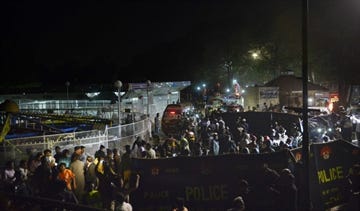Jamaat-ul-Ahrar, in Lahore Attack, Make Statement
An Easter Sunday celebration at a park in Lahore, Pakistan, was brutally interrupted by a suicide bomber in the twilight of March 27. The death toll stands at 67, the majority of whom are Muslim, but that number may rise as surgeons struggle to save lives and forensic crews go over the site. The extremist group Jamaat-ul-Ahrar has released a statement claiming responsibility for the attack.
Who are Jamaat-ul-Ahrar? And why did they strike this target, and strike now? Motivations are hard to discern from the US, but here’s what we know so far.
[T]he attack was a shock to Pakistan, not the least because Prime Minister Nawaz Sharif hails from Punjab province, where Lahore is located. As Reuters reported Sunday,
Punjab is [Pakistan’s] biggest and wealthiest province but has traditionally been more peaceful than other parts of [the country].
Sharif’s opponents have accused him of tolerating militancy in return for peace in his province, a charge he strongly denies.
The militant group has presented this attack as a direct challenge to Sharif. A spokesman for the group said in a statement claiming responsibility that
“We want to send this message to Prime Minister Nawaz Sharif that we have entered Lahore. He can do what he wants but he won’t be able to stop us. Our suicide bombers will continue these attacks.”
This isn’t the first time the group has struck targets in Lahore. This is the second attack that Jamaat-ul-Ahrar has carried out on specifically Christian targets in the city. Almost exactly a year ago, on March 15, 2015, the group attacked two Christian churches in Lahore, killing at least 80 people.
Both attacks were carried out in the same city by the same group in the same month, one year apart. It seems obvious that Jamaat-ul-Ahrar is making a clear statement here. It is going to bring its war and the violence directly to the country’s most influential and powerful province.
[J]amaat-ul-Ahrar is a splinter faction of the Tehrik-i-Taliban Pakistan, a loose umbrella of militant groups in the country. The TTP, as it’s known, has broken into at least two main parties in the wake of an internal schism in 2014. From Dawn:
The TTP is now effectively divided into two factions.
One is headed by Mullah Fazlullah, who was elected last November following the killing of ex-chief Hakimullah Mehsud in a US drone strike.
The other is headed by Umar Khalid Khorasani who is commanding the breakaway Jamatul Ahrar (freedom fighters group).
By March 2015, the two factions had publicly settled their differences, and Jamaat-ul-Ahrar and a wounded Khorasani rejoined the TTP. But the real story was not reconciliation, it had to do with access to power and legitimacy and a series of humiliating defeats.
Jamaat-ul-Ahrar and Khorasani suffered a blow in February of 2015 when the group sustained casualties in a battle with Afghan security forces in Afghanistan. In the wake of that battle (though it is unclear if the battle was the deciding factor) Khorasani and Jamaat-ul-Ahrar rejoined the TTP.
The TTP needed Jamaat-ul-Ahrar for its military capabilities. Jamaat-ul-Ahrar needed the TTP for its operational resources and local legitimacy. The alliance was reforged and the Lahore attack from March 2015 seemed timed to “celebrate” the reconciliation.
[S]ince then, Jamaat-ul-Ahrar has been rather quiet, except for a minor dust-up with TTP leadership over words of support for the Islamic State that were misconstrued as fealty.
The attack on Sunday may mark a new phase of the militant’s war on the Pakistani government. Targeting Lahore, for the second time in a year, is a direct challenge to Sharif. Targeting Christians, for the second year in a row, seems designed primarily to exploit that religion’s minority status in Pakistan.
Only 2 percent of Pakistanis are Christian. The fact that the majority of the bombing victims were Muslims will only help Jamaat-ul-Ahrar’s cause. Mix with Christians, get killed.
It remains to be seen what happens in Pakistan in the aftermath of this attack. A protest is taking place in Islamabad over the execution of political assassin Mumtaz Qadri. That protest combined with the attacks may cause the government to fall.
[S]harif is calling for a nationwide crackdown on the militant groups, a response that historically proves counterproductive when facing extremism. The BBC:
Mr Sharif added that security forces should go after the militants before they were able to strike again.
“I want more proactive coordination between law enforcement and intelligence agencies,” he said.
“Provinces should speed up intelligence-based operations against terrorists.”
The crackdown appears primarily aimed at militants in Punjab. Reuters:
Security and government officials told Reuters that the decision had been made to launch a full-scale paramilitary Rangers operation, giving them powers to conduct raids and interrogate suspects in the same way as they have been in the southern city of Karachi for more than two years.
The move, which has not yet been formally announced, represents the civilian government once again granting special powers to the military in order to fight Islamist militants.
It’s impossible to know what the real world consequences of these paramilitary operations will be. But theJamaat-ul-Ahrar attack, the pro-extremist protests in Islamabad, and the coming military crackdown all indicate a more unstable and fractious Pakistan going forward.
This post will update.





